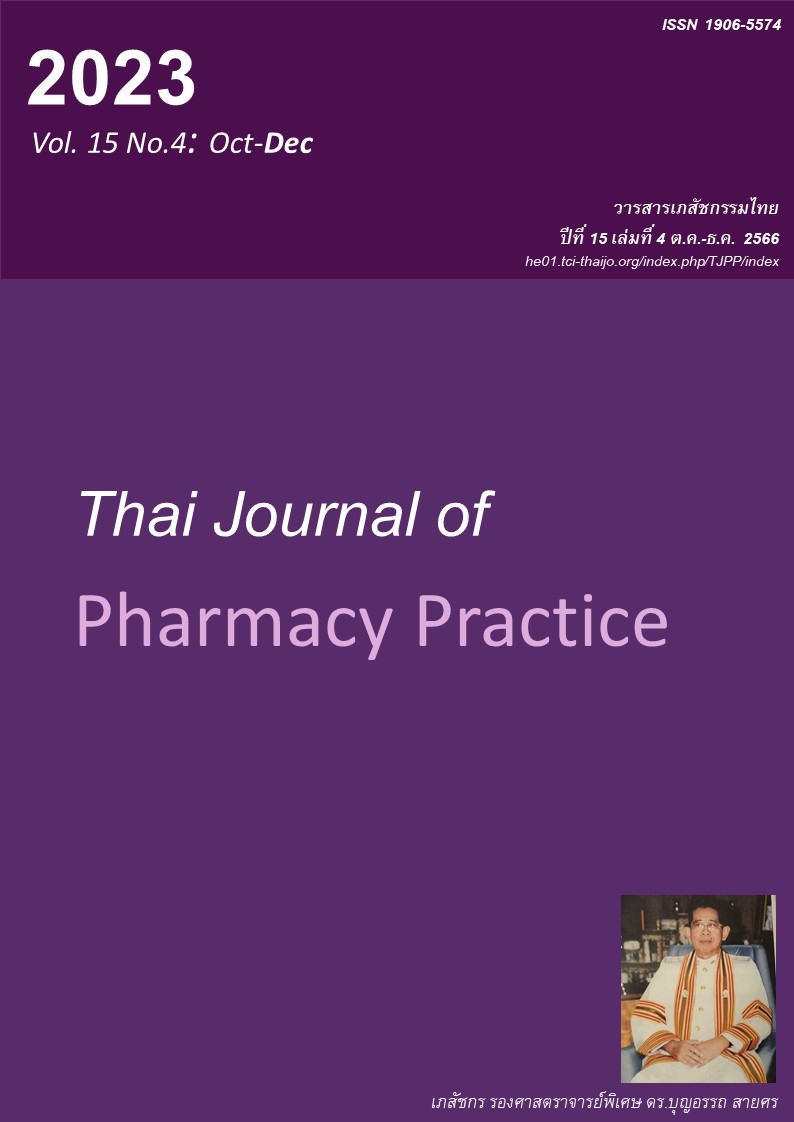ผลของกระบวนการสร้างความสอดคล้องต่อเนื่องทางยาในหอผู้ป่วย ของโรงพยาบาลชุมชนแห่งหนึ่งในภาคตะวันออกเฉียงเหนือ
Main Article Content
บทคัดย่อ
วัตถุประสงค์: เพื่อประเมินผลของกระบวนการสร้างความสอดคล้องทางยา (Medication Reconciliation, MR) ทั้งก่อนและหลังการพัฒนาระบบในโรงพยาบาลชุมชนแห่งหนึ่งในภาคตะวันออกเฉียงเหนือ วิธีการ: ผู้วิจัยเก็บข้อมูลทุติยภูมิจากเวชระเบียนผู้ป่วยในและฐานข้อมูลคอมพิวเตอร์ในช่วงก่อนการพัฒนาระบบและหลังพัฒนาระบบ MR เป็นเวลา 6 เดือน ช่วงก่อนการพัฒนา คือ 1 เม.ย - 30 ก.ย. 63 และเว้นช่วงระยะเวลาในการพัฒนาแบบฟอร์มและวางระบบใหม่ 1 เดือน คือ ต.ค. 63 และช่วงหลังการพัฒนา คือ 1 พ.ย. 63 - 30 เม.ย. 64 กลุ่มตัวอย่าง คือ ผู้ป่วยในที่เป็นโรคเรื้อรัง อายุ 18 ปี ขึ้นไป ที่มีการรับยาโรคเรื้อรังต่อเนื่องอย่างน้อย 1 รายการ และนอนรักษาตัวในโรงพยาบาลอย่างน้อย 1 คืน ผลลัพธ์หลักของการศึกษาได้แก่ 1. ร้อยละของผู้ป่วยที่ผ่าน MR ภายใน 24 ชั่วโมง 2. ความแตกต่างของรายการยาระหว่างที่แพทย์สั่งจ่ายและรายการยาเดิม และ 3.อัตราความคลาดเคลื่อนทางยาในขั้นตอนการสั่งใช้ยาต่อ 1,000 วันนอน ผลการวิจัย: กลุ่มตัวอย่างในช่วงก่อนพัฒนาระบบมีจำนวน 62 รายและหลังพัฒนาระบบมีจำนวน 62 ราย เมื่อเปรียบเทียบก่อนพัฒนาระบบและหลังพัฒนาระบบ พบว่า ร้อยละของผู้ป่วยที่ผ่าน MR ภายใน 24 ชั่วโมงเพิ่มขึ้น จากร้อยละ 93.55 เป็นร้อยละ 98.38 ความแตกต่างของรายการยาระหว่างที่แพทย์สั่งจ่ายและรายการยาเดิมของผู้ป่วยที่พบในขั้นตอนการแรกรับลดลงจากร้อยละ 21.29 เป็นร้อยละ 12.50 ของรายการยา ส่วนขั้นตอนจำหน่ายกลับบ้านพบสูงขึ้นเล็กน้อยจากร้อยละ 12.42 เป็นร้อยละ 13.07 อัตราความคลาดเคลื่อนทางยาขั้นตอนการรับเข้าโรงพยาบาลลดลงจาก 125 ครั้งต่อ 1,000 วันนอน เป็น 12.34 ครั้งต่อ 1,000 วันนอน ระดับความรุนแรงลดลงจาก C และ D เหลือเพียง C ส่วนอัตราความคลาดเคลื่อนทางยาขั้นตอนจำหน่ายกลับบ้านพบเฉพาะขั้นตอนก่อนการพัฒนาระบบคือ 5.21 ครั้งต่อ 1,000 วันนอนและมีความรุนแรงระดับ C ประเภทความคลาดเคลื่อนที่พบส่วนใหญ่ คือ การสั่งยาที่ไม่เคยได้รับมาก่อนและการไม่ได้รับยาเดิม สรุป: กระบวนการ MR ที่พัฒนาขึ้นในโรงพยาบาลสามารถลดความคลาดเคลื่อนทางยาและลดระดับความรุนแรงของอุบัติการณ์ได้ และเป็นกระบวนการที่สำคัญที่ช่วยให้ผู้ป่วยได้รับยาที่ถูกต้องและเหมาะสม
Article Details

อนุญาตภายใต้เงื่อนไข Creative Commons Attribution-NonCommercial-NoDerivatives 4.0 International License.
ผลการวิจัยและความคิดเห็นที่ปรากฏในบทความถือเป็นความคิดเห็นและอยู่ในความรับผิดชอบของผู้นิพนธ์ มิใช่ความเห็นหรือความรับผิดชอบของกองบรรณาธิการ หรือคณะเภสัชศาสตร์ มหาวิทยาลัยสงขลานครินทร์ ทั้งนี้ไม่รวมความผิดพลาดอันเกิดจากการพิมพ์ บทความที่ได้รับการเผยแพร่โดยวารสารเภสัชกรรมไทยถือเป็นสิทธิ์ของวารสารฯ
เอกสารอ้างอิง
World Health Organization. Medication without harm -Global patient safety challenge on medication safety [online]. 2017 [cited Sep 10, 2021] Available from: www.who.int/publications/i/item/WHO-HIS-SDS-201 7.6.
Pharmaceutical Society of Australia. Medicine safety: take care [online]. 2019 [cited Sep 10, 2021] Available from: www.psa.org.au/wp-content/uploads /2019/01/PSA-Medicine-Safety-Report.pdf
Lerdsirisopon S, Angkasuvan W, Viengteerawat S, Limapichat R, Prapongsena P, Ariyanuchitkul T, et al. Medication errors and adverse drug events: analysis from perioperative anesthetic adverse events in Thailand (PAAd Thai Study). J Med Assoc Thai 2018; 101: 826–36.
Phaktiyanuwat S. Comparison of medication error between the new prescribing system and conven- tional prescribing system in outpatients at Chaiya- phum. Chiangrai Medical Journal 2020; 12: 99-113.
Mekonnen AB, McLachlan AJ, Brien JE. (2016). Effectiveness of pharmacist-led medication recon- ciliation programs on clinical outcome at hospital transitions: a systematic review and meta-analysis. BMJ Open 2016; 6: e010003. doi: 10.1136/bmjopen-2015-010003.
Saithai S and Wongpoowarak P. Outcomes of medication reconciliation at the female medical ward in a general hospital. Thai Journal of Pharmacy Practice 2013; 5: 1-15.
Sriolarn N. Medication reconciliation preventing medi- cation errors by medication reconciliation process. Rayong Hospital Medical Journal 2016; 30: 1-11.
Phromkhot C, Rattanamahattana M. Development and evaluation of a hospital medication reconciliation process: A case study for diabetic in –patient service at a mid - level general hospital in the Northeast Region. Isan Journal of Pharmaceutical Sciences, 2017; 13: 49-58.
Jeenanan K, Cheawchanwattana A, Chantapasa K, Ningsanon T. Medication reconciliation processes in in-patient department of public hospitals in region 7 of National Health Security Office, Ministry of Public Health. Isan Journal of Pharmaceutical Sciences 2017; 13: 11-23.
Kaeokumbong C. The Effects of medication recon- ciliation in an inpatient unit of a community hospital. Thai Journal of Pharmacy Practice 2009; 1: 162–171.
Sirikantavanon C, Prakongsai N. Effect of a medi- cation reconciliation on medication error in diabetic patients, Prapokklao Hospital. Journal of Prapokklao Hospital Clinical Medical Education Center 2014; 31: 232-47
Chanatepaporn P, Anutchatchaval S, Nakornratana- chai P. Development of medication reconciliation at female-medicine ward in Srinagarind Hospital. Srina garind Medical Journal 2014; 29: 276-82.
Chanatepaporn P. Development of prescribing error program for reporting in Srinagarind Hospital. Srina garind Medical Journal 2019; 34: 261-70.
The Association of Hospital Pharmacist (Thailand). Fundamental framework for medicine systems. Bangkok: The Association of Hospital Pharmacist (Thailand); 2020.
The Healthcare Accreditation Institute (Public Organization). Patient safety goals: SIMPLE Thailand 2018. Nonthaburi: The Healthcare Accreditation Institute (Public Organization); 2018,
The Healthcare Accreditation Institute (Public Organization). Hospital and healthcare standards 4th Edition. Nonthaburi: The Healthcare Accreditation Institute (Public Organization); 2018,
Manias E, Kusljic S and Wu A. Interventions to reduce medication errors in adult medical and surgical settings: a systematic review. Ther Adv Drug Saf 2020; 11: 2042098620968309. doi: 10.117 7/2042098620968309.
Mazhar F, Akram S, Al-Osaimi YA, Haider N. Medication reconciliation errors in a tertiary care hospital in Saudi Arabia: admission discrepancies and risk factors. Pharm Pract 2017; 15: 864. doi: 10.18549/PharmPract.2017.01.864.
Tamblyn R, Abrahamowicz M, Buckeridge DL, Bustillo M,Forster AJ, Girard N, et al. Effect of an electronic medication reconciliation intervention on adverse drug events: A cluster randomized trial. JAMA Network Open 2019; 2: e1910756. doi: 10.1001/jamanetworkopen.2019.10756.
Van doormaal JE, van den Bemt PM, Mol PG, Zaal RJ, Egberts AC, Haaijer-Ruskamp FM, et al. Medi cation error: the impact of prescribing and transcribing error on preventable harm in hospi- talised patients. Qual Saf Health Care 2009; 18: 22-7
National Coordinating Council for Medication Error Report and Prevention [online]. [cited Sep 12, 2021] Available from: www.nccmerp.org/types-medication-errors
Chanthika S. Developing and implementing medi- cation reconciliation process following transition points in inpatient medication system [master thesis]. Bangkok; Chulalongkorn University; 2005.


